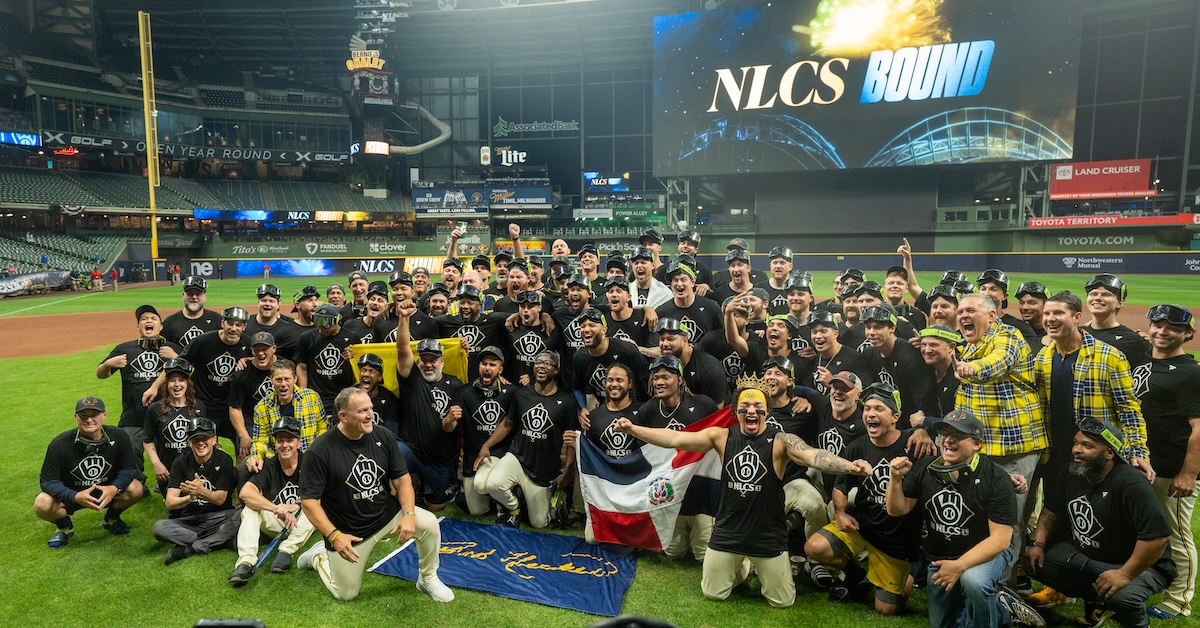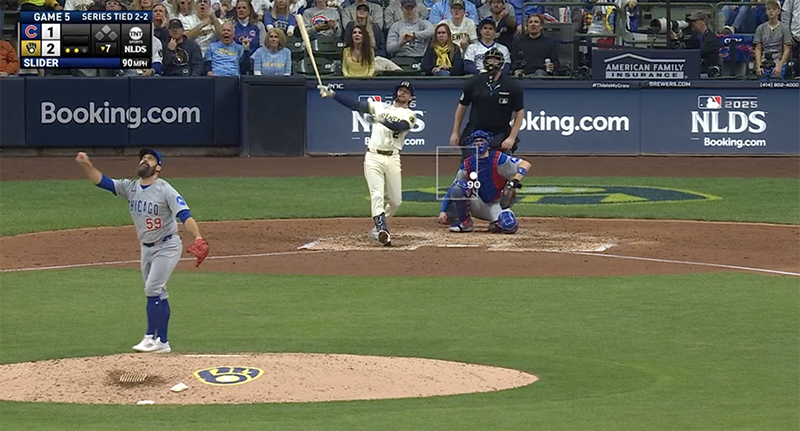Brewers Best Cubs in Game 5 Bullpen Battle to Advance to NLCS

The house always wins. In the National League Divisional Series between the Brewers and the Cubs, the home team won every game. Game 5, in which both teams ran out of trusted starters and turned to their bullpens, ended up being the lowest scoring game of the series. The scoring was limited to four solo home runs, and although the Cubs hit 57 more homers than the Brewers during the regular season and two more during this NLDS, the Brewers powered up when it counted. With home runs from William Contreras, Andrew Vaughn, and Brice Turang, they beat the Cubs, 3-1, and will host the Dodgers in Game 1 of the National League Championship Series on Monday.
Just as they’d done during the regular season, the two teams came as close as they possibly could to splitting the series. The Cubs took the regular season series, 7-6, and the Brewers have now taken the Divisional Series, 3-2, leaving the teams tied at nine. The Cubs will return to Chicago and ponder how to improve a roster that now has a massive, Kyle Tucker-shaped hole in the outfield. The Brewers are headed to the Championship Series for the fourth time in franchise history and the first time since 2018, when they lost to the Dodgers. After seven years, they’ll have the chance for revenge.
Although bullpen games involve plenty of mixing and matching, the early plans seemed pretty well scripted. Milwaukee came out of the gate with the big guns, hoping Trevor Megill could be the first pitcher of the entire series to hold the Cubs scoreless in the first inning, before Pat Murphy looked to Jacob Misiorowski for four. After that, the Brewers had the rest of their bullpen ready to match up, thanks to an off day on Friday. “The pitching guys, myself and Matt Arnold, we just sat in a room and just talked about the possibilities and considered a ton of factors,” said Murphy in the pregame press conference. “But we settled on Megill. He’s going to pitch tonight, regardless.”
The Cubs opened with Drew Pomeranz, then let Colin Rea go through the order one time. “I think both sides are kind of acknowledging that the first inning has been a pretty big inning in this series,” said Craig Counsell before the game. “We went with a guy that’s throwing the ball really well.” After that, they had the option of bringing in starter Shota Imanaga, or mixing and matching with the bullpen. Although Imanaga started warming up in the fourth inning, he never entered the game.
In the top of the first, Megill fulfilled his assignment, mowing the Cubs down in order with a four-seamer that touched 98.9 mph. Pomeranz tried the same trick in the bottom of the inning, throwing 23 pitches, 19 of them fastballs. After retiring Jackson Chourio and Turang, his fastball luck ran out. Contreras reached out and smashed Pomeranz’s 17th four-seamer, not at all bothered by its perfect location on the outside corner. He pulled the ball just over the wall in left-center, where Milwaukee bullpen catcher Adam Weisenburger, in full gear, caught it and then raised his arms in triumph:
The Brewers had a 1-0 lead, but it wouldn’t last long. In the bottom of the second, Misiorowski followed velocity with even more velocity, replacing Megill’s 99-mph heat with his own gas, which averaged 100.3 mph. It didn’t work out. Seiya Suzuki went with a 101.4 mph four-seamer on the outer half and lifted it into his own bullpen in right-center field. A Cubs pitcher tried to replicate Weisenburger’s feat, raising his hat to catch the homer, but the ball knocked it right out of his hand:
It was Suzuki’s first hit against a pitch thrown 100 mph or faster this year, and just the second in his four-year MLB career. The Cubs had tied the game at 1-1, but that was the last run they’d score. Misiorowski settled down, allowing just one baserunner over the next three innings. He finished with four innings pitched, three hits, three strikeouts, and his second win of the series.
The Brewers grabbed the lead in the fourth. Rea followed Pomeranz and pitched well, allowing a seeing-eye single to Caleb Durbin in the bottom of the second and pitching around a rare error from Dansby Swanson in the third. Rea retired the first two Brewers he faced in the fourth, but he left a cutter right over the middle of the plate for Vaughn, and he absolutely clobbered it. The ball passed over a leaping Happ, giving the Brewers the 2-1 lead. Vaughn threw up devil horns as he rounded first base:
Chicago’s only real threat came in the top of the sixth, when Murphy replaced Misiorowski with lefty Aaron Ashby. It made sense from a platoon standpoint, as the Cubs had the top of their lineup coming to the plate, which included lefties Michael Busch and Tucker. Still, it was a questionable move. Ashby had pitched in three of the first four games, going 4 1/3 innings and allowing four runs, three of them earned. Moreover, the top of the Chicago lineup had already had two chances to get familiar with him. Things immediately went sideways. Busch sent a grounder up the middle for a single, then Ashby hit Nico Hoerner, putting runners on first and second with no outs. Ashby struck out Tucker, and that was the end of his night. Murphy was never going to let him face the right-handed Suzuki, who had already taken him deep in Game 2. Chad Patrick, who had held the Cubs scoreless in his own three appearances in the series, continued his dominance. He retired Suzuki on a deep fly ball, then froze Happ with a perfectly placed cutter on the outside corner for the third out. The Cubs would only reach base once more in the final three innings. Meanwhile, the Brewers were about to add on.
Andrew Kittredge came in to get the final out of the sixth inning, and Counsell sent him back out in the seventh, hoping to get four outs from the righty for just the third time all season and the first time since the Fourth of July. It was one out too many. After retiring the first two batters he faced, Kittredge started Turang off with a slider on the outside part of the plate. Turang unleashed a remarkably smoth swing, and although the ball was ticketed for the deepest part of the park, everyone in the building knew it was gone off the bat. Turang held his follow-through and Kittredge swung around to watch the ball. For one beautiful moment, both players had their right arms raised and their heads thrown back as they followed the ball:

Four hundred feet away, Pete Crow-Armstrong made a wild leap at the fence, but the ball bounced off the back wall a good 20 feet in the air. The Brewers had tacked on an all-important insurance run, leading by more than one run for the first time since the fourth inning of Game 2:
With a 3-1 lead, Murphy called on Abner Uribe to get the final six outs. After striking out more than 30% of the batters he faced this season, Uribe didn’t strike out a single Cub, but he slammed the door on them anyway. Working extremely quickly, he allowed just one walk to Busch in the eighth inning and needed just 22 pitches to end Chicago’s season. The Cubs finished the game with just four hits and one walk. Aside from Suzuki’s home run, they only got one runner past first base.
In a double bullpen game, the bullpens truly were the stars. The two teams combined for just 10 hits. Durbin and Busch were the only players to reach base more than once. In the bulk role, Misiorowski got the win and pitched the longest, but the Brewers got scoreless appearances from Megill, Ashby, Patrick, and Uribe. The Cubs got their own scoreless appearances from Daniel Palencia, Caleb Thielbar, and Brad Keller. With neither team able to manufacture runs, the whole season came down to who could put the ball over the fence. The Brewers’ three two-out homers allowed them to move on. In the NLCS, they’ll be facing a Los Angeles team they swept twice during the regular season. If they’re going take a third series off the Dodgers, they’re sure to need even more zeroes from the bullpen.
Davy Andrews is a Brooklyn-based musician and a writer at FanGraphs. He can be found on Bluesky @davyandrewsdavy.bsky.social.
Congrats to the Brewers!
Really glad for Jacob as a good part of Brewer Nation wanted him kept off the roster for among other things deemed too emotional to handle the postseason.
Chad Patrick, another rookie pitcher getting big outs.
I will think about the Dodgers come Monday.
Go Crew!